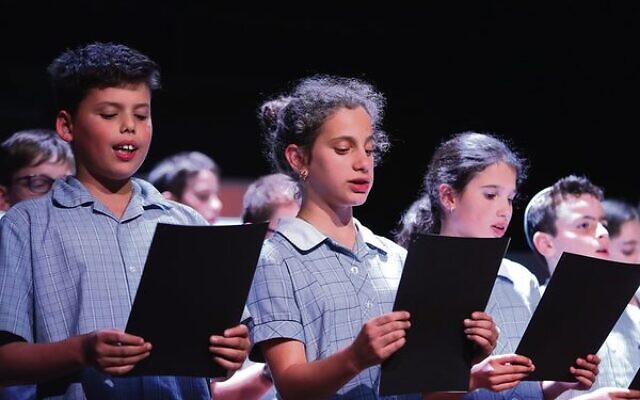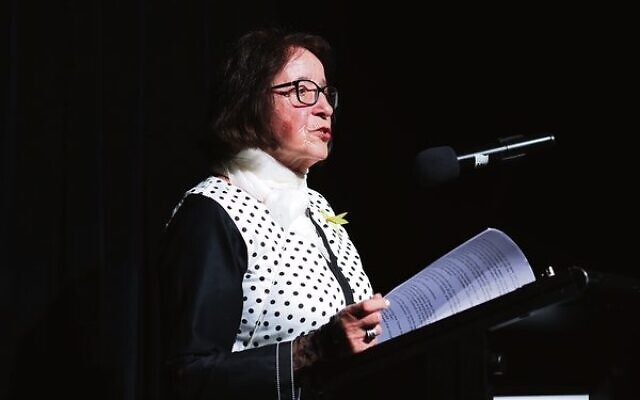Warsaw Ghetto heroism
For the first time since the global pandemic began, the Melbourne community was able to come together, in person, to commemorate Yom Hashoah.

COMMEMORATIONS marking Yom Hashoah and 80 years since the heroic uprising in the Warsaw Ghetto – the largest Jewish revolt during the Shoah – have drawn hundreds in Melbourne’s Jewish community to special events.
Melbourne’s annual commemoration of Yom Hashoah was held on Monday night as an in-person gathering – for the first time since before the pandemic in 2019 – to mark the 80th anniversary of the rebellion by Jewish resistance fighters in April and May 1943.
The following day, Inheriting Memories, jointly presented by the Melbourne Holocaust Museum and the Museum of Inherited Memories, saw author Bram Presser, musicians Emily Lubitz and Lior Attar, student and poet Ezra Lubitz, and educator Sarah Grynberg, offering reflections on how Holocaust memories have transited generations.
On Wednesday night, Attorney-General Mark Dreyfus, whose father arrived in Australia just before the war, addressed an 80th-anniversary commemoration of the Warsaw Ghetto uprising organised by the Jewish Labour Bund and SKIF.
“Eighty years on, we remember the Warsaw Ghetto uprising for many reasons,” he said. “We admire the defenders of the ghetto who placed a higher value on the survival of their community – their families, their friends, their fellow Jews – than their own survival. We reflect on the bravery of those who surely understood a small number of untrained, poorly equipped men could not prevail for long against armed and organised German SS troops and police. We look aghast at the inhumanity.”
Dreyfus said his colleague Macnamara MP Josh Burns “is also the grandson of migrants who fled Europe and settled in Melbourne”.
At Glen Eira Town Hall on Monday, a capacity audience, including MPs and councillors, filled the auditorium for the Jewish Community Council of Victoria (JCCV)’s solemn remembrance.
Many wore a paper daffodil, styled after the notorious Nazi yellow star imposed on Jews, but conveying a message of hope as the commemorative flowers left at the Warsaw Ghetto memorial site each April.
Declaring, “Resilience, courage and strength will be explored tonight through testimony, music and song,” presenter Liora Miller, whose late mother survived a wartime labour camp in Siberia, noted some 31,000 Holocaust survivors had settled in Melbourne.
“They built new lives, all the while making sure that the part of them that remained back in a labour camp or the ghetto or a concentration camp was as small as possible,” she said.
JCCV president Daniel Aghion, whose grandfather was liberated from Mauthausen, reflected, “His answer to the Nazis was the new life that he and my grandmother made here in Australia.”
Six survivors – Milan Bierenkrant, George Deutsch, Guta Goldstein, Ken Hamer, Regina Lipshut and Louis Roller – lit candles for the six million Jews who perished.
Chazan Brett Kaye recited Kaddish and chanted Kel Malei Rachamim. The Bashevis Singers performed Kaddish By The Ruins: A Liturgy and vocalist Freydi Mrocki, accompanied on the piano by Tomi Kalinski, sang Tsvey Yidishe Hent (Two Jewish Hands), an ode to resistance fighters.

Rona Zinger, a child survivor, related her harrowing story. Born in 1943 during a Nazi edict forbidding Jewish births, Zinger told of her mother wearing clothing that concealed her pregnancy. “Even her friends didn’t know.”
In Kovno in 1940, Zinger’s parents Rone and Schmuel Rozenthal witnessed the Soviet invasion of Lithuania. When Germany invaded Russia in 1941, Lithuania soon fell to the Nazis. Lithuanians blamed Jews for the earlier Soviet occupation, and many Jews were murdered.
A ghetto was established in Kovno in 1941, and initially Jews welcomed it as protection from locals, said Zinger. But later that year, the Nazis liquidated the ghetto, killing almost all its inhabitants, including Zinger’s grandparents. In 1943, the SS turned the ghetto into Kauen (Kovno) concentration camp, where Zinger’s parents joined a resistance.
“My mother’s role in the underground organisation was to rescue children from the ghetto,” she said. Rone Rozenthal, a teacher, used her pre-war ties to a monastery to hide children. Zinger’s brother Leo had already been hidden, surviving in a dugout under a stove.
She was sedated and smuggled out of the camp in a sack. Taken to a village on the Baltic Sea, she was classed as an abandoned gentile baby, adopted by villagers, named Lily and baptised.
Rone perished at Stutthof before it was liberated. At war’s end, Schmuel, worn down to a “muselmann” (emaciated camp prisoner), clung to life. In 1949, just before his daughter’s sixth birthday, he won a long fight with Lithuania’s courts to overturn her adoption. He renamed his girl Rona after her mother.
Leaving Lithuania in 1978, Zinger considers herself fortunate, despite her turbulent childhood, and a battle with cancer which she has won.
“May we remember the 1.5 million children and others who were murdered,” she said. “May they live forever in our hearts.”

comments